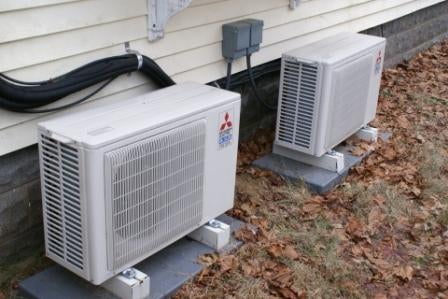Homeowners can choose between heating systems such
as furnaces, boilers and heat pumps for keeping their home warm during
the winter months.
There are a few different ways that you can choose to power your furnace heating system. This is done through electricity, fuel, or natural gas. Often the type of system that powers this set up depends on whatever is cheaper in your area. If your system is using gas or oil, the particular fuel you use will mix with the air in the system and burn. This causes the metal heat exchanger to heat up and transfer the heat into all the system’s air. A furnace fan pushes heat through the exchanger and into the duct work, eventually getting to the different rooms in the house.

Sometimes furnaces can get a little energy inefficient, especially where the combustion products are concerned. Whenever you have a furnace, you need to get the combustion products out of your home. Older furnaces would take the combusted products through air holes and up out of a home’s chimney. This wasted around 30 percent of the energy the system used. As a result of this inefficiency, modern systems were designed with an inducer fan. This fan pulls the exhaust gases and causes them to draft into the chimney.
Boilers:
Another heating system that works fairly well is the boiler setup. Boilers use a system of combining heat, water and radiators to get hot air into different parts of a building or house. With Ravinia heating you can get the latest boiler system installed in your home.
When you turn on the boiler, it begins to distribute heat into the water, which causes the water’s temperature to eventually pass its boiling point. This produces hot steam and air that goes through every location in the system. The boiler system has a cycle where cool water goes back to the boiler and is reheated in order to continuously warm up a building.
If you want a boiler system for your residential property, you are probably going to fuel it with natural gas or oil. Boiler systems do not come with any fans or ducts. Instead, you have pipes and radiators that carry this hot air across the building and into different units. Boilers always come with valves and thermostats in order to effectively set an ideal temperature. The last thing you want is your boiler overheating an entire building by five or six degrees!
Heat Pumps:
The third and final system worth mentioning is the heat pump. These are simply air conditioners that work in two ways. When you are experiencing hot weather, the air conditioner moves heat out of a room into the general atmosphere. In the winter, the heat pump uses its electric system to generate warm air from the outside climate and pump this into the room. Heat pumps also come with different systems to get this hot or cold air into multiple rooms of one house or building.
Heat pumps come in two major varieties: air-source and ground-source. The air-source pumps use outside air, while the ground-source systems use underground air conditions to get what they need for cooling or heating. Because underground air is typically less impacted by the weather, this system works very well. However, ground-source heat pumps are generally more expensive, which is why most heat pumps you see in homes or buildings are air-source systems.
Not only are ground-source pumps likely to work better, they are also far more energy efficient. This is because they do not have to use electricity or other fuel in order to heat up cold air in the winter, or cool down warm air in the summer. Even though this costs more, you can talk to Ravinia heating about the option of a ground-source heat pump if you know you are going to live in the same home for the next five or ten years. It might cost more up-front, but the long term energy savings make up for this high price.
Source : Click here



